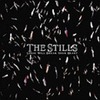The Stills
Bio
The hiss of tape may seem nostalgic in the land of digital recordings and MP3, but for Montreal’s The Stills it’s more than an scratch from the distant past. That hiss recalls the band’s very beginnings, because without a simple, chunky-looking four track tape recorder The Stills just wouldn’t be.
“It’s like our Rosetta stone, you can trace everything about The Stills back to that four track,” explains Tim Fletcher, The Stills 25 year-old singer-guitarist. “A friend of ours who’d ran into financial troubles in London called-up and said ‘take some of my belongings just send me some money’, so we took that.” Splitting the cost with close friend and Stills drummer Dave Hamelin, a frantic exchange of ideas began hurtling between them.
“We shared the recorder so I’d listen to whatever Tim did before me and then he’d listen to what I done,” recalls Hamelin. “It would be, ‘I liked his song, I’m going to try to make a better one’. We created our own little universe.” From early experiments this private world began to take shape, fleshed-out with a delicate melancholy born from a shared restlessness. “The only moments when we felt we could truly let go were when we were recording,” explains Fletcher who with Hamelin writes The Stills’ material. “When you’re playing you’re not thinking of anything else, not even what you’re playing, you’re just doing. So we created everything for those moments. Ultimately we wanted to feel like that all the time.”
It was clear then their recorded experiments required a wider audience, so recruiting lead guitarist Greg Paquet and bassist Oliver Crowe (both, along with Hamelin, 23) from various aborted local bands the four had served in, and in search of wider exposure they temporarily swapped French-speaking Montreal to spend the summer of 2002 gigging in New York.
They immediately garnered attention. Interpol became firm friends, they supported The Yeah Yeah Yeahs among others and Vice Magazine’s record label signed the band. More touring followed, and after their debut release the Rememberese EP in April 2003, last summer they again settled in New York to record album Logic Will Break Your Heart with ex-pat Canadian producer Gus Van Go.
Echoing the four track swapping days, the pace was again frantic. “We almost lost our minds,” admits Fletcher. “We had just two months to record the album. We recorded all day, then would just sit up all night in this loft in Brooklyn freaking out over the next day’s work. It was like working in a factory – all day every day.” However, the urgency transfigured the album. Fused with paranoia and desolation but tinged with humour and hope, Logic Will Break Your Heart is a record of sweeping romanticism struggling against a homogenised world. “To me the album is about that defeatism,” explains Hamelin. “The world is heartbreaking. When you’re young and you have ideals you strive to push through boundaries, then as you get older and are forced to get a job you realise how the system works and logic breaks your heart.”
From the disillusioned disgust of opener Lola Stars And Stripes, the album moves between elegant regret and tragic optimism through a shimmering emotional backdrop. Like a vocal answer to The Smiths’ instrumental Oscillate Wildly, the smoothly textured Changes Are No Good highlights this restless spirit.
“A lot of the songs change their emotional attack,” explains Hamelin of the album’s evolving dynamics. “Tim sings all the songs on the record except one and I wrote 75 per-cent of them, so he adds his emotions to my songs. I’m always trying to be ironic, but when he sings it’s more sincere which adds a weird twist.”
It’s apparent on the cutting Allison Krausse which spitting with hurt reveals The Stills’ vicious side, while the Still In Love Song proves an infecting mantra caught somewhere between self-belief and self-delusion. Clearly The Stills have drawn from some dark places, but among the scything guitars and brutal percussion, soul-warming tunes ensure their debut long player doesn’t wallow in despair. Closing with the lullaby-like Yesterday Never Tomorrow, Logic Will Break Your Heart might be a tour of the heart’s dark-side but it’s one that always points towards the light. “There’s a hope there too,” concludes Fletcher of the swirling emotions. “I guess if you don’t have that hope then there’s nothing.”

 Without Feathers
Without Feathers
 Destroyer
Destroyer
 Logic Will Break Your Heart
Logic Will Break Your Heart
 Lola Stars And Stripes
Lola Stars And Stripes